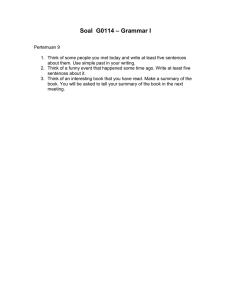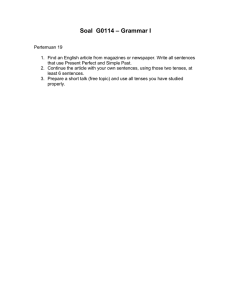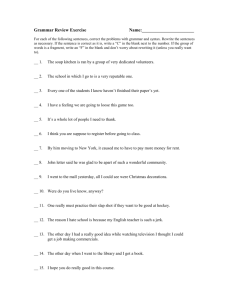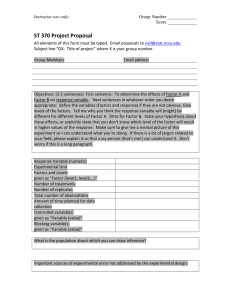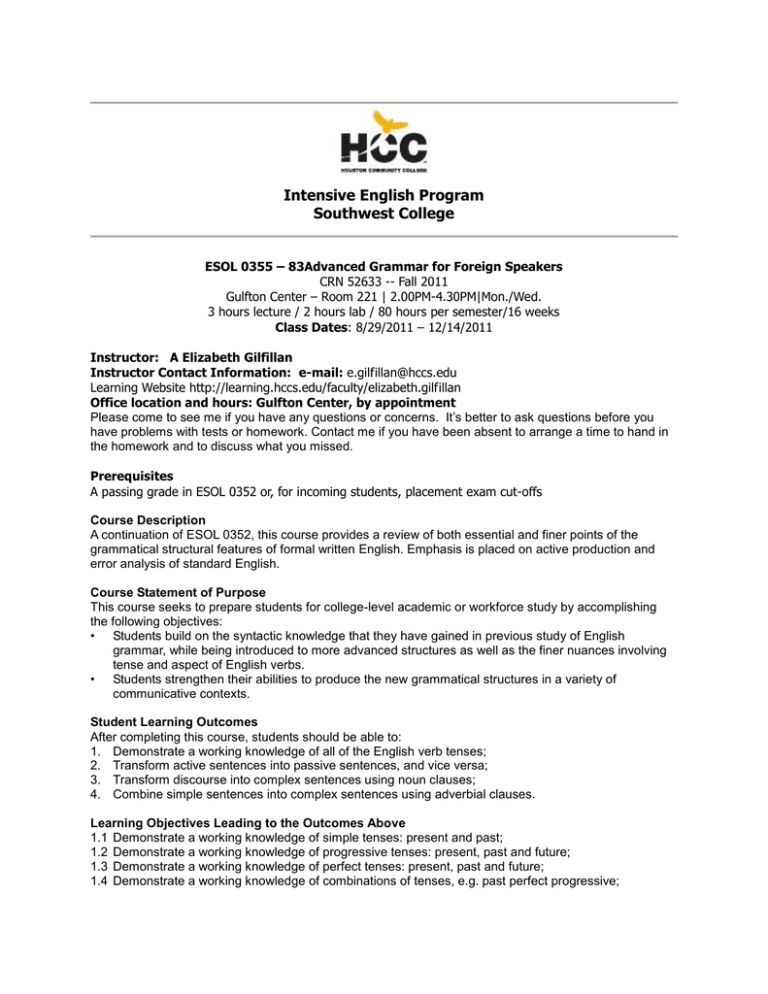
Intensive English Program
Southwest College
ESOL 0355 – 83Advanced Grammar for Foreign Speakers
CRN 52633 -- Fall 2011
Gulfton Center – Room 221 | 2.00PM-4.30PM|Mon./Wed.
3 hours lecture / 2 hours lab / 80 hours per semester/16 weeks
Class Dates: 8/29/2011 – 12/14/2011
Instructor: A Elizabeth Gilfillan
Instructor Contact Information: e-mail: e.gilfillan@hccs.edu
Learning Website http://learning.hccs.edu/faculty/elizabeth.gilfillan
Office location and hours: Gulfton Center, by appointment
Please come to see me if you have any questions or concerns. It’s better to ask questions before you
have problems with tests or homework. Contact me if you have been absent to arrange a time to hand in
the homework and to discuss what you missed.
Prerequisites
A passing grade in ESOL 0352 or, for incoming students, placement exam cut-offs
Course Description
A continuation of ESOL 0352, this course provides a review of both essential and finer points of the
grammatical structural features of formal written English. Emphasis is placed on active production and
error analysis of standard English.
Course Statement of Purpose
This course seeks to prepare students for college-level academic or workforce study by accomplishing
the following objectives:
• Students build on the syntactic knowledge that they have gained in previous study of English
grammar, while being introduced to more advanced structures as well as the finer nuances involving
tense and aspect of English verbs.
• Students strengthen their abilities to produce the new grammatical structures in a variety of
communicative contexts.
Student Learning Outcomes
After completing this course, students should be able to:
1. Demonstrate a working knowledge of all of the English verb tenses;
2. Transform active sentences into passive sentences, and vice versa;
3. Transform discourse into complex sentences using noun clauses;
4. Combine simple sentences into complex sentences using adverbial clauses.
Learning Objectives Leading to the Outcomes Above
1.1 Demonstrate a working knowledge of simple tenses: present and past;
1.2 Demonstrate a working knowledge of progressive tenses: present, past and future;
1.3 Demonstrate a working knowledge of perfect tenses: present, past and future;
1.4 Demonstrate a working knowledge of combinations of tenses, e.g. past perfect progressive;
1.5 Demonstrate a working knowledge of combined tense forms using modal verbs, e.g. should have . . .
, must have . . . , etc.
2.1
2.2
2.3
2.4
Accurately describe the structure of the passive verb form;
Summarize the conditions in which the passive verb form is preferred;
Transform active sentences into passive sentences;
Transform passive sentences into active sentences.
3.1 Distinguish between direct quotation and indirect quotation (reported speech);
3.2 Accurately transform sentences using direct quotation into sentences using indirect quotation, using
the appropriate sequence of tenses, pronoun transformation and other required changes;
3.3 Accurately parse a sentence with an embedded quotation or question, identifying the basic parts of
that sentence (subject + predicate);
3.4 Transform two simple sentences into an appropriate complex sentence using the process of
nominalization to turn one sentence into a noun clause in the other.
4.1 Accurately distinguish classes of subordinating conjunctions according to function (time, causality,
condition, reason, concession, comparison, contrast, etc.);
4.2 Transform simple sentences into complex sentences using appropriate subordinating conjunctions;
4.3 Demonstrate a working knowledge of construction of conditional sentences according to their truth
conditions (i.e. real v. unreal) and time (i.e. present v. past);
4.4 Accurately distinguish between the meaning of sentences containing wish and that of sentences
containing hope.
16-WEEK COURSE CALENDAR
Week One
Introductions, orientation, diagnostic work
Chapters 1-2
Week Two
Chapters 3-5
Week Three
Continuation of Chapters 3-5
Week Four
Test #1 over Chapters 1-5
Chapter 20
Week Five
Continuation of Chapter 20
Chapter 11
Week Six
Continuation of Chapter 11
Week Seven
Test #2 over Chapters 20 and 11
Chapter 8
Week Eight
Chapters 14-15
Midterm Examination
Midterm reports
Week Nine
Chapter 12
Week Ten
Chapter 13
Week Eleven
Continuation of Chapter 13
Test #3 over Chapters 12-13
Week Twelve
Chapter 9
Week Thirteen
Chapter 10
Week Fourteen
Chapters 7-8
Week Fifteen
Test #4 over Chapters 7-10
Review for final examination
Week Sixteen
Final Examination
(The instructor may change this calendar if needed)
Instructional Methods
Readings with a grammar focus
Listening activities to hear the grammar in spoken English
Writing whose purpose is to use the grammar
Student-produced dialogs using the language (pairs or groups)
Activities for spoken practice of grammar
In lab, grammar computer programs, writing activities using the grammar
In lab, grammar book exercises
Error correction exercises
Discovering or recalling the grammar from example sentences
Exercises in the course book or on handouts
Lectures
Assignments
Written exercises from the grammar book or handouts
Listening exercises for grammar and pronunciation of grammar
Dialogs and written work using the grammar
Homework exercises
Late homework: If homework is one day late without a reason that is acceptable to your instructor, the
grade will go down 25 points. Two days late = 50 points down. Late homework will not be accepted after
the second day. If you miss classwork, you cannot receive full credit for making it up.
Assessments
Chapter tests
Quizzes (some unannounced) on work covered in class and on homework or topics we have been
studying
A midterm examination and a final examination
Dictionaries and electronic devices are not allowed in tests and quizzes.
Missed examinations or quizzes: Please do not be absent on testing days. Missed examinations or
quizzes can be made up only if you can provide what your instructor considers an acceptable reason for
having a second chance. Missed Examination and Quizzes will be given at 1.30pm on class days by
appointment.
Instructional Materials
Understanding and Using English Grammar, 3rd edition, Azar (Pearson Longman Publishers)
English-English dictionary: Oxford Advanced Learner’s Dictionary
OR
Longman Dictionary of American English
A binder, dividers, and lined paper
A computer flash drive
HCC Policy Statement: Academic Dishonesty
Any form of copying, cheating, or plagiarism will result in a grade of 0 for the assignment. The instructor
will decide whether to permit you to make up the work, and under what circumstances it might be made
up. If you are charged with academic dishonesty, pleading ignorance of the rules will not help you.
Penalties and/or disciplinary proceedings may be initiated by HCC officials against a student who is
accused of scholastic dishonesty. “Scholastic dishonesty” includes, but is not limited to, cheating on a
test, plagiarism, and collusion.
Cheating on a test includes:
Copying from another students’ test paper;
Using materials not authorized by the person giving the test;
Collaborating with another student during a test without authorization;
Knowingly using, buying, selling, stealing, transporting, or soliciting in whole or part the contents
of a test that has not been administered;
Bribing another person to obtain a test that is to be administered.
Plagiarism means the appropriation of another’s work and the unacknowledged incorporation of that work
in one’s own written work offered for credit.
Collusion means the unauthorized collaboration with another person in preparing written work offered for
credit. Possible punishments for academic dishonesty may include a grade of 0 or F in the particular
assignment, failure in the course, and/or recommendation for probation or dismissal from the College
System.
See the HCCS Student Handbook for further information.
HCC Policy Statement: Attendance
According to the HCC Student Handbook, you may be dropped from a course after accumulating
absences in excess of 12.5 percent of the total hours of instruction (lecture and lab). For Intensive English
if you exceed a total of 10 hours (12.5%) of absence in any class, including labs, you can be dropped
from all Intensive English classes. This will make F1 students out of status and cause visa problems. If
you are absent, it is your responsibility to contact your instructor to find out what you have missed and
whether it is possible to make up the work. If you do not take this responsibility, you risk receiving grades
of zero and not being allowed to make up the work. No absences are excused. Class attendance leads to
class success.
Tardiness and in-class time absence
Classes and tests begin on time. Lateness of ten minutes or more counts as a class or lab absence. You
can enter the classroom, but you will be counted absent. Lateness after break times, leaving early or
disappearing for more than five minutes during class or lab are also counted as absences. Texting, using
social networking sites, or other improper use of technology during class time or lab time are also counted
towards your absences (1 warning = 1 tardy).
HCC Withdrawal Deadline
To drop a class, you must speak with a counselor or an advisor. The nearest place to see one is in
Gulfton Room 117. The last day students may withdraw or be dropped from a class with a grade of W is
Thursday November 3rd h before 4:30 p.m. Students who have excessive absences after that date will
receive the grades they earn. Note: International students will be out of status if they drop or are
dropped from their classes and may have to return to their countries. Speak with a counselor or
an advisor before dropping classes to make sure you understand the procedures.
HCC Policy on Students Repeating a Course for the Third Time
Repeating students:
Grades of IP or F are failing grades; the student will have to repeat the course. A student who fails a class
for the second time must receive a grade of F for that class. Students who repeat a course for three or
more times will have to pay a higher tuition fee at HCC and other Texas public colleges and universities. If
you are having trouble in class, talk to your teacher and get help from a tutor. Get other assistance from a
counselor before withdrawing or for advice if your grades are not passing. Students should get help so
that they will not fail. Tutoring is also available at Gulfton Center after school on Tuesdays, Wednesdays
and Thursdays from 1:30 to 2:30 in Room 121 and on Fridays from 9:00 -11:00 in the Audio Lab.
HCC Policy Statement: ADA
Services to Students with Disabilities Students who require reasonable accommodations for disabilities
are encouraged to report to Dr. Becky Hauri at 713-718-7910 to make necessary arrangements. Faculty
is only authorized to provide accommodations by the Disability Support Service Office. Please see this
website for more information: http://hccs.edu/student-rights
HCC Policy on Sexual Harassment
Sexual harassment in any form is not tolerated at Houston Community College. It is a violation of HCCS
policy for an employee, agent, or student of the college to engage in sexual harassment as defined in the
EEOC guidelines (EEO/AA Compliance Handbook 47). See HCCS Student Handbook for more
information.
CLASSROOM BEHAVIOR
Treat your classmates and teacher with respect. Use English. Make the most of your class time by
actively participating in discussions and activities. Turn off your cell phone during class. If you are
expecting an emergency call, ask your instructor’s permission to leave your cell phone on vibrate.
Use of Camera and/or Recording Devices
Use of recording devices, including camera phones and tape recorders, is prohibited in classrooms,
laboratories, faculty offices, and other locations where instruction, tutoring, or testing occurs. Students
with disabilities who need to use a recording device as a reasonable accommodation should contact the
Office for Students with Disabilities for information regarding reasonable accommodations.
Misuse of Electronic Devices in the Classroom
The use of electronic devices by students in the classroom is up to the discretion of the instructor. Any
use of such devices for purposes other than student learning is strictly prohibited. If an instructor
perceives such use as disruptive and/or inappropriate, the instructor has the right to terminate such use.
If the behavior continues, the student may be subject to disciplinary action to include removal from the
classroom or referral to the Dean of Student Services. (Please see the Attendance Policy for this class.)
Disruptive Behavior: Students who conduct themselves in a manner that significantly interferes with
college teaching, research, administration, disciplinary procedures or other authorized college activities
(including its public service functions) on the college premises will be subject to disciplinary action. Any
student who behaves in this way may be required by the instructor to leave the classroom and be counted
absent for the rest of that class period.
INSTRUCTOR’S REQUIREMENTS
The teacher needs to:
Create a rich environment for learning and student interaction.
Give students extra learning resources in class and in lab on topics connected to the course
Make classes, projects, tests, assignments, policies, dates, and regulations clear.
Tell students about important HCC policies such as attendance and academic honesty (no
cheating).
Make arrangements to be available to students when they need help or have questions.
Give help when needed
Provide grading scales and assessment.
Make a class calendar available.
To succeed in college the students need to:
Work hard, attend all classes, and be on time. Good attendance + hard work = SUCCESS
If you are absent for all or part of a class, you are responsible for contacting the instructor as
soon as possible to find out what you missed and to find out if the work can be made up.
Pay attention, listen carefully and ask questions. Listen and be respectful to other students’
contributions.
Create a good learning environment. Turn off cell phones or use vibrate mode for emergencies.
No Texting in class.
Concentrate. Use English only in class time and sit next to someone who doesn’t speak your
language.
Eat well for energy. The brain needs good food. Eat breakfast at home and lunch in break times.
Do homework. The brain learns by seeing new words and ideas many times in different ways.
Do your own work and learn. Copying from the Internet and other sources is not learning.
Have fun with English. Read, write, listen and speak English in daily life through TV, neighbors, students
and coworkers, and volunteering in the community. Use technology for learning online in English learning
sites.
PROGRAM AND ESL DISCIPLINE REQUIREMENTS
Basic Requirements for ESOL 0355
Students in 0355 Advanced will fulfill the following:
• A minimum of three chapter tests + a midterm examination, or four chapter tests, all of which must test
for both recognition and production of grammatical structures within a communicative context
• A lab program consisting of grammar exercises correlated to the grammar presented in the “lecture”
classes
• A final examination
HCC Grading Scale
90-100% =A 80 – 89% = B
ESOL 0355 Grading Formula
Chapter Tests
Daily classwork, homework, Lab
Midterm Examination
Final Examination
70 – 79% = C
Below 70% = IP or F (not passing)
50%
10%
20%
20%
100%
EGLS Evaluation for Greater Learning Student Survey System
At Houston Community College, professors believe that thoughtful student feed back is necessary to
improve teaching and learning. During a designated time, you will be asked to answer a short on line
survey of research-based questions related to instruction. The anonymous results of the survey will be
made available to your professors, and division chairs for continual improvement of instruction. Look for
the survey part of the Houston Community College Student System on line near the end of term.
Important Dates and Holidays
Labor Day (No classes)
Gulfton Book Sale
Gulfton Halloween Carnival
Last Day for Administrative/Student Withdrawals
Thanksgiving Break (No classes)
Final Examinations
September 5
October 4-5
October 27
November 3 at 4:30 PM
November 24-25
December 12-14

